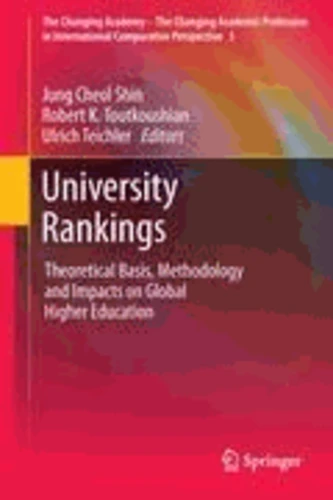University Rankings. Theoretical Basis, Methodology and Impacts on Global Higher Education
Par :Formats :
- Paiement en ligne :
- Livraison à domicile ou en point Mondial Relay indisponible
- Retrait Click and Collect en magasin gratuit
- PrésentationCartonné
- Poids0.562 kg
- Dimensions16,3 cm × 24,8 cm × 2,0 cm
- ISBN9789400711150
- EAN9789400711150
- Date de parution01/06/2011
- CollectionThe Changing Academic Profession...
- ÉditeurSpringer
Résumé
pThis ground-breaking and exhaustive analysis of university ranking surveys scrutinizes their theoretical bases, methodological issues, societal impact, and policy implications, providing readers with a deep understanding of these controversial comparators. The authors propose that university rankings are misused by policymakers and institutional leaders alike. They assert that these interested parties overlook the highly problematic internal logic of ranking methodologies even as they obsess over the surveys' assessment of their status.
The result is that institutions suffer from short-termism, realigning their resources to maximize their relative rankings. While rankings are widely used in policy and academic discussions, this is the first book to explore the theoretical and methodological issues of ranking itself. It is a welcome contribution to an often highly charged debate. Far from showing how to manipulate the system, this collection of work by key researchers aims to enlighten interested parties./p
The result is that institutions suffer from short-termism, realigning their resources to maximize their relative rankings. While rankings are widely used in policy and academic discussions, this is the first book to explore the theoretical and methodological issues of ranking itself. It is a welcome contribution to an often highly charged debate. Far from showing how to manipulate the system, this collection of work by key researchers aims to enlighten interested parties./p
pThis ground-breaking and exhaustive analysis of university ranking surveys scrutinizes their theoretical bases, methodological issues, societal impact, and policy implications, providing readers with a deep understanding of these controversial comparators. The authors propose that university rankings are misused by policymakers and institutional leaders alike. They assert that these interested parties overlook the highly problematic internal logic of ranking methodologies even as they obsess over the surveys' assessment of their status.
The result is that institutions suffer from short-termism, realigning their resources to maximize their relative rankings. While rankings are widely used in policy and academic discussions, this is the first book to explore the theoretical and methodological issues of ranking itself. It is a welcome contribution to an often highly charged debate. Far from showing how to manipulate the system, this collection of work by key researchers aims to enlighten interested parties./p
The result is that institutions suffer from short-termism, realigning their resources to maximize their relative rankings. While rankings are widely used in policy and academic discussions, this is the first book to explore the theoretical and methodological issues of ranking itself. It is a welcome contribution to an often highly charged debate. Far from showing how to manipulate the system, this collection of work by key researchers aims to enlighten interested parties./p

